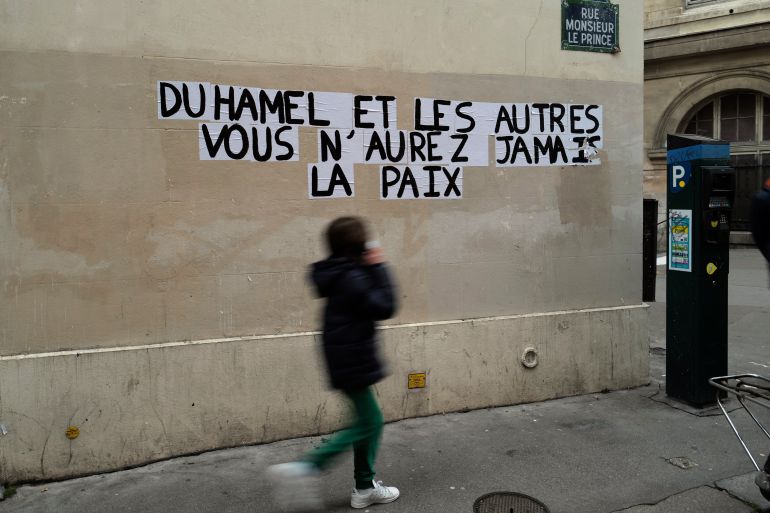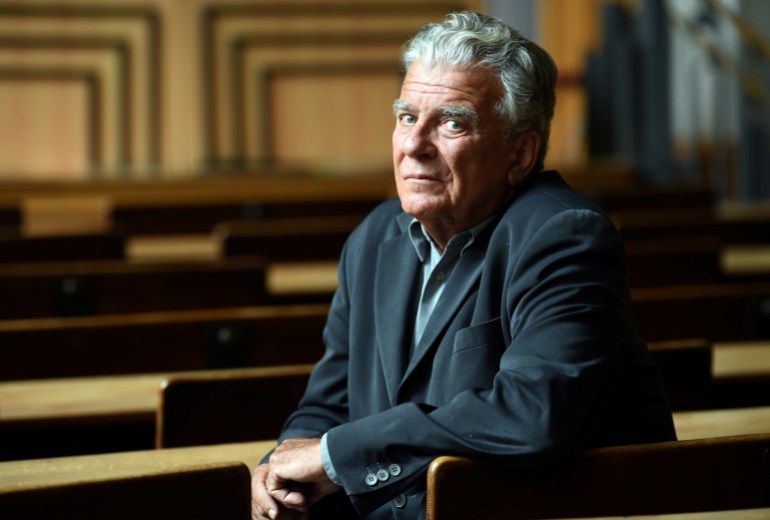#MeTooInceste: Victims of incest in France are speaking up online
Thousands have taken to social media to share their experiences of sexual violence using the hashtags #MeTooInceste and #MeTooGay.

Paris, France – In a video posted on social media on Saturday, French President Emmanuel Macron spoke directly to victims of incest and other forms of sexual violence against children, saying that their voices were finally being heard.
“You will never be alone again,” Macron said.
Keep reading
list of 4 itemsSouth Korea court orders Japan to compensate former sex slaves
Real Madrid star Karim Benzema to stand trial in sex tape case
Egyptian man jailed for 3 years for sexual assault in #MeToo case
During the two-minute address, he promised to adopt tougher laws to fight sexual violence and enforce stricter punishments against perpetrators.
The video came about a week after the hashtag #MeTooInceste started trending on social media, followed by the hashtag #MeTooGay.
The rise of the hashtags come with the fall of two high-profile individuals; Olivier Duhamel, one of France’s most prominent intellectuals, and Maxime Cochard, a member of the Paris City Council.
Duhamel is under investigation for allegedly raping his underage stepson.
Cochard has been accused on social media of raping an 18-year-old, vulnerable man.
‘Our society protects aggressors’
The accusations have inspired hundreds of thousands of victims to share personal experiences of rape and incest on social media.
Victims like Camille Gillet.
Gillet was 13 when her uncle raped her. He was a 26-year-old navy officer.
He only served a one-year suspended sentence. Today, he has a successful career and, according to Gillet, “is living his best life”.
It is a frustration she cannot shake.
“He was able to have a normal life, I had to fight for it,” Gillet wrote in a thread posted on Twitter recounting her trauma.
“Our society protects these aggressors, sometimes it even legitimises their acts,” Gillet wrote.

Many applauded Macron’s Saturday address as an important step towards acknowledging the victims instead.
“It took seven days, but finally [the government] is grasping the moment and getting on board,” Muriel Salmona, a psychiatrist who specialises in supporting victims of trauma, told France Info radio.
According to a November 2020 Ipsos poll, one in 10 French citizens is a victim of incest.
Culture of Secrecy
The case of Duhamel, the affair that launched #MeTooInceste, was exposed earlier this month after his stepdaughter, Camille Kouchner, published a book accusing him of sexually abusing her twin brother, Antoine, more than 30 years ago.
At the time, Antoine was only 14.
France’s public prosecutor has opened an investigation into the allegations and Duhamel has resigned from his post at Sciences Po University in Paris, and his roles as a commentator on LCI television and the radio station Europe 1.
But the scandal runs deeper than the abuse itself.
In her book, La Familia Grande, Kouchner describes a culture of secrecy that kept family members from discussing the incest.
Kouchner’s father, France’s former foreign minister Bernard Kouchner, said in a statement: “A heavy secret that has been weighing on us for too long has happily been lifted. I applaud the courage of my daughter Camille.”
But the affair has raised questions about who in Duhamel’s circle knew about the accusations before they became public.
According to the Le Monde newspaper, the director of Sciences Po, Frederic Mion, allegedly found out about the allegations against Duhamel as early as 2018 but failed to reprimand him.
Elisabeth Guigou, France’s former justice minister and a friend of Duhamel’s, resigned earlier this month from her post as head of an independent commission looking into claims of incest.
Guigou insists that she had no prior knowledge of the accusations against him.
Whether prominent members of Duhamel’s inner circle knew about the abuse, critics say the affair has cast a light on a deep wound inflicting French society: indifference, even acceptance, when it comes to incest and paedophilia.
“It reveals a culture of silence,” Gillet told Al Jazeera. “It makes one think back to the words of certain politicians or media commentators who have minimised, even romanticised paedophilia.”

Gillet said the scandal also reminded her of the Gabriel Matzneff affair. Matzneff, a French writer who spoke openly about his paedophilia, faced his own reckoning last year when one of his victims published a book detailing being abused by him when she was 14.
The allegations also exposed Matzneff’s circle of elite friends who spent decades protecting him despite knowledge of the abuse.
On Thursday, the hashtag #MeTooGay started trending after a man accused Maxime Cochard, an elected official working for the Paris Mayor’s Office, and his spouse of raping him in 2018 when he was 18.
“They took advantage of my youth, my naivety,” the accuser, who used the pseudonym Prunille, wrote on Twitter.
Cochard, a member of the French Communist Party (PCF), released a statement, calling the allegations “totally false” and said he was filing a defamation complaint.
But the affair has inspired thousands in France’s LGBTQ community to share their experiences of underage abuse, using the hashtag #MeTooGay.
Calls for stricter laws
The discussion comes as France’s Senate has moved to unanimously adopt a bill to criminalise sexual acts between adults and children under 13. The bill was passed on January 21.
“This text was not developed in reaction to the political and media explosion caused by Camille Kouchner’s book … but this book gives the legislature the opportunity to take a clear position,” Annick Billon, the bill’s author said.
Some lawmakers are calling for even stricter measures.
Alexandra Louis, an MP with Macron’s La Republique en Marche (LREM) party, told Al Jazeera she was proposing a minimum 15-year prison sentence for any adult found guilty of sexually abusing minors.
She also said more needed to be done to educate children about how to report abuse.
“[Incest] is an incredibly taboo subject in French society,” Louis said. “We need to raise awareness amongst children that they are not alone and there are measures they can take,” she said.
Camille Gillet, who spoke about her abuse on Twitter, said laws would only go so far.
What France really needs, she said, is a reckoning.
“We need to completely change the way we look at these crimes,” she said. “And we especially need to stop punishing the victims by letting aggressors get away with what they did as if their crimes didn’t matter.”